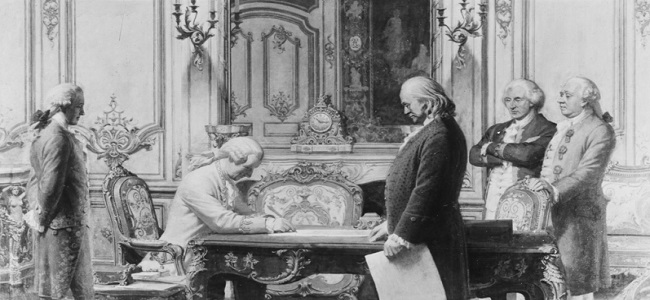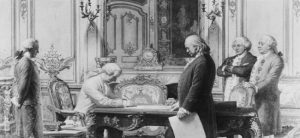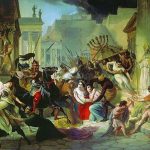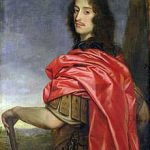History, Holidays & Observances on December 17
Today: Saturnalia, Sol Invictus & the history of Christmas; France recognizes America during the Revolution; Grant, orders the Jews expelled with General Order No. 11, Christmas Music
And More . . .
December Holidays of Ancient Rome – Saturnalia, Sol Invictus, & Christmas
The “bleak midwinter,” that being the time around the annual winter solstice, was a time of celebration, in one form or another, throughout the ancient world. Crops had long been harvested and processed. Excess farm animals for whom there was not enough food to last the winter were slaughtered, so meat was available. Alcoholic beverages made from the harvested crops had fermented and were now ready to consume. Planting would not begin for another few months, so this was the least busy time of the year.
Three Ancient Roman holidays in the midwinter are of note — Christmas of course we know, but the other two, Saturnalia and Sol Invictus, we should know since their traditions at least in part inform our Christmas. Since Dec. 17 would have been the day for the start of Rome’s major festival, Saturnalia, today is a good time to note all three and how they are interrelated.
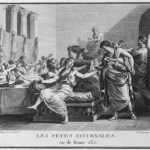 Dec. 17: Saturnalia – This was a major festival celebrated in Ancient Rome beginning in 497 B.C. to honor Saturn, the Roman God of agriculture and the harvest. Beginning on this day, the celebration would go on for six days in the city. All public offices and schools were closed. Public feasts were held, the temples held services and made sacrifices, gifts were exchanged, and social norms were ignored. The celebration continued annually until being subsumed by Christmas at the end of the 4th century.
Dec. 17: Saturnalia – This was a major festival celebrated in Ancient Rome beginning in 497 B.C. to honor Saturn, the Roman God of agriculture and the harvest. Beginning on this day, the celebration would go on for six days in the city. All public offices and schools were closed. Public feasts were held, the temples held services and made sacrifices, gifts were exchanged, and social norms were ignored. The celebration continued annually until being subsumed by Christmas at the end of the 4th century.
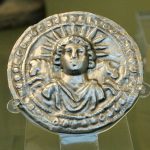 Dec. 25: Dies Natalis Solis Invicti – The cult of Sol, God of the Unconquered Sun (Sol Invictus), had existed in the empire since at least the 2nd century B.C. It became popular in Rome itself during the late Roman Empire, and in 274 A.D., the Roman emperor Aurelian set the feast day for the God as Dec. 25.
Dec. 25: Dies Natalis Solis Invicti – The cult of Sol, God of the Unconquered Sun (Sol Invictus), had existed in the empire since at least the 2nd century B.C. It became popular in Rome itself during the late Roman Empire, and in 274 A.D., the Roman emperor Aurelian set the feast day for the God as Dec. 25.
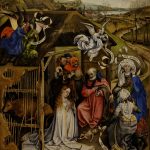 Dec. 25: Christmas – A third celebration arose in ancient Rome in 336 A.D. and made official in 350 A.D. Within 30 years, it had subsumed both Saurnalia and Dies Natalis Solis Invicti. We know it as Christmas. So when we celebrate the 2019 celebration of the birth of Jesus Christ this year, we will be engaging in the world’s 1,669th official Christmas celebration. How did that happen?
Dec. 25: Christmas – A third celebration arose in ancient Rome in 336 A.D. and made official in 350 A.D. Within 30 years, it had subsumed both Saurnalia and Dies Natalis Solis Invicti. We know it as Christmas. So when we celebrate the 2019 celebration of the birth of Jesus Christ this year, we will be engaging in the world’s 1,669th official Christmas celebration. How did that happen?
Roman emperors had subjected Christians to centuries of persecution, the most brutal (and that is saying a lot) being the last, the Diocletian Persecutions of 303-313 A.D. But, to quote Tertullian, “the blood of the martyrs was the seed of the Church.” That persecution ended in 313 A.D. when Constantine the Great issued the Edict of Milan, granting tolerance at law to the Christian religion within the empire. Almost seventy years later, in 380 A.D. Roman Emperor Theodosius I would make “Nicene” Christianity the state religion of the Roman Empire with the Edict of Thessalonica.
In between these two titanic events, St. Julius I became the Pope. And he, in perhaps the first known act of syncretism by the Papacy, decreed in 350 A.D. that Dec. 25 would be set as the day to celebrate the birth of Jesus Christ.
The Bible does not specify a date for the birth of Jesus Christ, nor does it give enough clues from which it can be determined without pure speculation. We do not know Pope Julius I’s reasoning for setting the day of Christmas as Dec. 25, as he left us no clues, but it is easy enough to see that he wanted to place a major Christian day of remembrance and feasting at the midwinter. And doing so on the 25th of December placed Christmas overtop of Saturnalia and Dies Natalis Solis Invicti.
You will note that I said the celebration of Christmas “subsumed” Saturnalia and Dies Natalis Solis Invicti, not that it erased them. That is because, while Christmas came to replace those pagan holidays, it retained many of the customs of those holidays that were not in conflict with Christian dogma; they were simply made a part of the Christmas celebration. And that is the essence of a policy, syncretism, the Papacy would adopt during the first millennium of the Church and beyond, syncretism. Probably the most famous memorialization of a papal order to use the process of syncretism comes from the writings of the Venerable Bede, who notes that in 601 A.D., Pope Gregory sent a letter to his missionaries instructing them to adapt local customs and places of worship as part of the conversion process whenever possible.
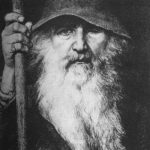 Scratch most any Christian holiday today and you will find it replete with pagan customs that long predate it. At Christmas, we celebrate with customs derived from the Romans at Saturnalia and Germanic customs, such as the yule log, Santa Claus and the hanging of Christmas stockings, all associated with Odin and the Yuletide. At Easter, we celebrate the resurrection of Christ. But the Easter bunny, the eggs, and even the name, Easter, are purely pagan.
Scratch most any Christian holiday today and you will find it replete with pagan customs that long predate it. At Christmas, we celebrate with customs derived from the Romans at Saturnalia and Germanic customs, such as the yule log, Santa Claus and the hanging of Christmas stockings, all associated with Odin and the Yuletide. At Easter, we celebrate the resurrection of Christ. But the Easter bunny, the eggs, and even the name, Easter, are purely pagan.
None of that takes away from the Christian purpose or meaning behind the respective holidays. But it does explain the ancient customs behind many of the holidays and it ties us to the richness of our shared history.
The Great O’s – During the final week of the Advent Season, the “Magnificat antiphons,” also referred to as the “Great O’s,” are used at Vespers (evening service). They are referred to as the “Great O’s” because the title of each one begins with the vocative particle “O”.
The importance of the “O Antiphons” is twofold. First, each one is a title for the Messiah. Secondly, each one refers to the prophecy of Isaiah of the coming of the Messiah. The Latin antiphons are from the Breviarium Romanum. The English versions, which are not always literal translations of the Latin, are from the Church of England’s Common Worship liturgy. Biblical quotations are from the NRSV.
The “Great O” celebrated today is
O Sapientia (O Wisdom):
Latin:
- O Sapientia, quae ex ore Altissimi prodiisti,
- attingens a fine usque ad finem,
- fortiter suaviterque disponens omnia:
- veni ad docendum nos viam prudentiae.[8]
English:
- O Wisdom, coming forth from the mouth of the Most High,
- reaching from one end to the other,
- mightily and sweetly ordering all things:
- Come and teach us the way of prudence.
Isaiah had prophesied:
- “The spirit of the Lord shall rest on him, the spirit of wisdom and understanding, the spirit of counsel and might, the spirit of knowledge and the fear of the Lord. His delight shall be in the fear of the Lord.” Isaiah 11:2-3
- “[…] he is wonderful in counsel, and excellent in wisdom.” Isaiah 28:29
1777 – France formally recognizes the United States.
It is hard to overstate the degree of animosity between the French and the British that existed in 1777. They were archenemies that had been at war almost more than they had been at peace over the past half millennium. Their most recent, the Seven Years War, ended in 1763 with a crushing British victory. The French chafed for revenge.
So when the colonists rebelled against Britain, France was the first nation they looked to for support. And France, for its part, was ready to receive them – to a point. France was always ready to cause problems for Britain. It was not always ready to go to start yet another war between itself and Britain. Thus, in 1775, France began covertly providing the American rebels with arms, powder and money. For there to be open support and for France to enter the war, France would have to be assured, one, that the American colonists fully intended to break from Britain and two, that the colonists could win the war.
The Continental Congress took care of France’s first concern when, on July 4, 1776, they issued the Declaration of Independence. Convincing France that the colonists could win the war was a much harder problem. Indeed, on October 26, 1776, when the Second Continental Congress sent Ben Franklin off to France as their chief liaison, it seemed almost a certainty that the colonists were about to lose the war. British forces had severely beaten Washington’s Continental Army and it was in full retreat across New Jersey.
When Ben Franklin arrived in France, he was overjoyed to learn of Washington’s victories that saved the Revolution at Trenton and Princeton, but he knew there was no chance yet of convincing France to do more than covert support. So Franklin, the world’s first international celebrity, spent the better part of 1777 schmoozing the French aristocracy – particularly the wives. He had done all that he could by December, 1777, when word finally arrived that the colonists had defeated General Burgoyne’s forces at Saratoga and captured his entire Army.
News like that was what Franklin had been awaiting. It was now apparent to the French that the colonists stood a chance of winning against Britain. Only then did he approach the French King. On this day in 1777, France formally recognized the United States of America. Within two months, France and America would sign a formal treaty of alliance, bringing France into the war and completely changing the nature of the American Revolution. For Britain, it would become a World War.
1903 – The Wright Brothers make the first powered flight at Kittyhawk
After years of testing revolutionary designs on gliders, Wilbur and Orville Wright, brothers, self-taught engineers, and partners in a bicycle shop, achieved their first powered flight. On this date,
[They] took to the air . . . making two flights each from level ground into a freezing headwind gusting to 27 miles per hour. The first flight, by Orville at 10:35 am, of 120 feet in 12 seconds, at a speed of only 6.8 miles per hour over the ground . . . The next two flights covered approximately 175 and 200 feet, by Wilbur and Orville respectively. Their altitude was about 10 feet above the ground. . . .
Amazingly enough, few newspapers covered the Wright brothers work on aviation and they labored in partial obscurity for several more years. But labor they did as they tried to build a commercial product, and within three years, they were flying their Wright Flyer III piloted by Orville over Huffman Prairie, over 20 miles in 33 minutes 17 seconds.
The Wright Brothers were never truly able to truly exploit their success commercially. They were slow off the mark in getting patents and they were poor marketers. They experienced modest success, but Wilbur died in 1912 and Orville sold their airplane business in 1915. Still, on this day in 1903, thanks to their work, the Aviation Age was born.
546 – Rome had fallen greatly from its perch as a great city and seat of an empire by 546. Still, it was a sufficiently inviting target that barbarian armies would spend great resources to invade and sack the city. On this day in 546, the Ostrogoths under king Totila plundered Rome after a year long siege. Totila succeeded in the end by bribing the Byzantine garrison defending the city.
1538 – In the midst of the English Reformation that had been ongoing since 1529 and several years after Henry VIII had declared himself Supreme Head of the Anglican Church, Pope Paul III finally excommunicated Henry VIII when he began dissolving the monasteries in England. Had the papacy been quicker to act, it might have been of more effect.
1862 – General Ulysses S. Grant, on this date during the Civil War, issued General Order No. 11, expelling Jews from parts of Tennessee, Mississippi, and Kentucky. It was soon rescinded by President Lincoln within weeks. Grant would later claim that he did not issue the order out of antisemitism, but to address a problem of corruption and trade with the enemy.
1938 – Otto Hahn, a German scientist, was the first to discover the nuclear fission of the heavy element uranium, the scientific and technological basis of nuclear energy. He was not a part of the Nazi nuclear weapons project, however, and American scientists arrived at the same discovery independently, but later. For his work, Hahn won the Nobel Prize in 1944.
1943 – All Chinese are again permitted to become citizens of the United States upon the repeal of the Chinese Exclusion Act of 1882 and the introduction of the Magnuson Act, allowing for up to 105 Chinese immigrants to annually enter the U.S.
1944 – On this day during the Battle of the Bulge, a Nazi unit under the command of Gen. Peiper committed the Malmedy Massacre, executing 85 American soldiers captured in their advance. Peiper’s orders to his soldiers for the offensive were “that no quarter was to be granted [and] no prisoners taken”
2010 – Mohamed Bouazizi, a Tunisian street vendor, set himself on fire to protest his treatment by the government. This act became the catalyst for the Tunisian Revolution and the wider Arab Spring.
1619 – Prince Rupert of the Rhine, a professional soldier who saw his first action at the age of 14, he spent most of his life in war, from the Commander of the Royal Cavalry in the English Civil War, to commander of a privateer, and then as an Admiral in the English Navy during the Anglo-Dutch Wars.
1894 – Arthur Fiedler, a long-time conductor of the Boston Pops Orchestra. With a combination of musicianship, showmanship and marketing, he made the Boston Pops one of the best-known orchestras in the United States.
Died on Dec. 17
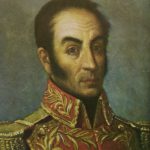 1830 – Simón Bolívar, Venezuelan general and politician who led the independence of what are currently the states of Venezuela, Bolivia, Colombia, Ecuador, Peru, and Panama from the Spanish Empire.
1830 – Simón Bolívar, Venezuelan general and politician who led the independence of what are currently the states of Venezuela, Bolivia, Colombia, Ecuador, Peru, and Panama from the Spanish Empire.
Christmas Music
Harry James Brazilian Sleigh Bells
Johnny Cash
https://youtu.be/LmK2fjcGb8Y
